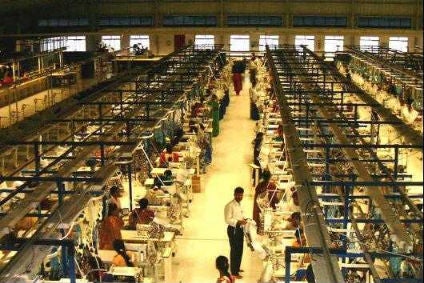
Export-oriented Indian garment manufacturers emerging from lockdown are struggling to fulfil new orders due to severe labour shortages caused by the continuing migration of workers to their traditional village homes.
These problems have persisted, despite the government on 1 June lifting the Covid-19 related lockdown that had prevented factories from operating without special permission.
“We will have to make air shipments for some orders as the production schedule has been delayed due to labour shortage,” Sudhir Sekhri, managing partner of Trend Setters Group in Gurugram (also called Gurgaon), near New Delhi, told just-style. “Despite our best efforts, we are not able to hold back the workers and the numbers are constantly decreasing.”
To make matters worse, it is the skilled clothing cutters and sewers who are leaving rather than support staff, who are more likely to be living near urban factories, Sekhri adds.
Shipping garments by air to make up time caused by worker shortages can increase the cost of garments by 5% to 10%, according to Harminder Sahni, managing director of Gurgaon-based consultancy firm Wazir Advisors. “Your [company’s] margins are cut to half and if you are not efficient you may end up losing money because of air lifting,” he told just-style.
The main cause of migration to traditional villages is the fear among worker’s families that Covid-19 infections are more prevalent and deadlier in cities than in rural areas. The rapidly rising numbers of Covid-19 cases in India have already exceeded 250,000 according to the government, with 9,471 new cases, and the timing could not have been worse for garment exporters.

US Tariffs are shifting - will you react or anticipate?
Don’t let policy changes catch you off guard. Stay proactive with real-time data and expert analysis.
By GlobalData“The [overseas] buyers have started giving [cancelled] orders back with some discounts,” A Sakthivel, chairman of India’s Apparel Export Promotion Council (AEPC) told just-style. “Also for the next season, buyers are asking for samples to be made, so – slowly – more orders will be coming in.”
To solve the labour problem, he says the government should run special trains to transport workers back from their villages to urban manufacturing centres as many workers who left in March will be running short of money and ready to return to work, and train and bus services are still largely suspended.
Reduced production capacity
Such pressures are currently only being felt by export-oriented manufacturers, according to a briefing note from the Clothing Manufacturers Association of India (CMAI). It said that by the end of May, only 22% of garment factories serving the domestic market had restarted, with 40% of these mainly manufacturing masks and personal protective equipment. The reason is that “the domestic apparel business has reported almost ‘ZERO’ production of regular products in May 2020,” said the note.
The CMAI’s president, Rahul Mehta, told just-style that for the next three to four months, local market-oriented garment manufacturers are not going to require more than 40% to 50% of their production capacity, so the labour shortages faced by export-oriented units would not trouble them.
However, “if the workers do not come back by October or November then there is going to be a very serious crisis,” he adds.
Worker shortages are the latest troubles to hit Indian clothing suppliers.
The country’s apparel industry is thought to have lost shipments worth more than US$3bn due to order cancellations and delays during the coronavirus pandemic, while losses for India’s footwear industry are understood to have amounted to around US$1bn.
Unions have also slammed some Indian states for suspending or amending existing labour laws and increasing working hours to try to curb the impact of the Covid-19 mandated lockdown, with the changes affecting a number of industries, including textiles.



